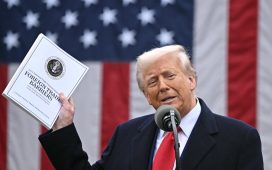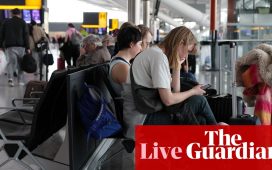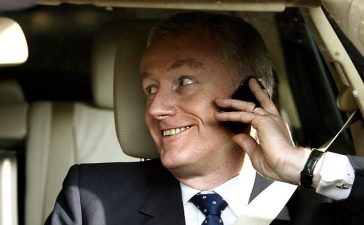UK factory orders ‘collapse’ to four-year low – CBI

Phillip Inman
Total orders at UK factories “collapsed” this month to their lowest level since the height of the Covid-19 pandemic in 2020, according to an industry survey.
Providing further evidence of the gloom descending on the economy in recent months, the CBI’s latest industrial trends survey shows that manufacturers suffered the worst slump in orders since November 2020.
Export orders dived along with commissions from UK customers to leave a balance of firms that said total orders were up or down at -40, from -19 in November.
Ben Jones, CBI lead economist, said manufacturers are facing a combination of weakening external demand on the one hand, amid political instability in some key European markets and uncertainty over US trade policy.
And on the other hand, domestic business confidence has collapsed in the wake of the budget, which has increased costs and led to widespread reports of project cancellations and falling orders.
Factories also cut back production. The CBI said its balance of firms showed a decrease in output in 15 out of 17 sub-sectors in the three months to December.
Rob Wood, chief UK economist at Pantheon Macroeconomics, said the CBI survey revealed a “collapse in total orders that corroborated the signal from December’s flash PMI that the outlook for the manufacturing sector has deteriorated sharply”.
He said the survey can be volatile, but it highlights the difficulties faced by the Bank of England’s monetary policy committee (MPC) when it meets tomorrow.
The MPC wants to be sure that inflation remains low over the medium term, but the difficulties faced by businesses hit by higher taxes from next April and resistance from the central bank to cut interest rates could push the UK towards a recession.
Key events
Closing summary
Total orders at UK factories “collapsed” this month to their lowest level since the height of the Covid-19 pandemic in 2020, according to an industry survey.
Providing further evidence of the gloom descending on the economy in recent months, the CBI’s latest industrial trends survey shows that manufacturers suffered the worst slump in orders since November 2020.
Export orders dived along with commissions from UK customers to leave a balance of firms that said total orders were up or down at -40, from -19 in November.
Ben Jones, CBI lead economist, said manufacturers are facing a combination of weakening external demand on the one hand, amid political instability in some key European markets and uncertainty over US trade policy.
Financial markets are waiting for the US Federal Reserve’s interest rate decision at 7pm UK time. The US central bank is widely expected to cut borrowing costs by a quarter point.
Trading is lacklustre ahead of the decision. In particular, investors will be watching for any signals on where rates will go next year when Fed chair Jerome Powell holds a press conference half an hour later.
UK inflation has risen to its highest level in eight months, adding to pressure on the Bank of England to keep interest rates unchanged on Thursday despite a slowdown in the British economy.
The consumer prices index rose by 2.6% last month from 2.3% in October, driven by the rising cost of petrol, groceries and an increase in tobacco duty in the budget.
The reading from the Office for National Statistics, which matched City economists’ forecasts, showed the headline rate rising further above the Bank’s 2% target for a second consecutive month.
The ONS chief economist, Grant Fitzner, said:
Inflation rose again this month as prices of motor fuel and clothing increased this year but fell a year ago. This was offset partially by air fares, which traditionally dip at this time of year, but had their largest drop in November since records began.
Our other main stories:
Thank you for reading. We’ll be back tomorrow. Bye! – JK
Wall Street opens flat ahead of Fed rate decision
Wall Street has opened broadly flat, as markets wait for the US Federal Reserve’s final interest rate decision of the year – most likely a quarter point cut – and clues on whether policymakers may slow down rate reductions next year, with the economy resilient.
Over here, the UK’s FTSE 100 index is 14 points ahead at 8,210, a 0.2% gain, while the Italian market has also edged up by 0.2% and the German and French indices are flat to slightly higher.
ING economist Frantisek Taborsky said:
We expect the Federal Reserve to deliver a consensus 25bp cut today, but also to scale back on guidance for rate cuts next year. We think this will allow the dollar to stay firm into year-end as wide differentials remain highly favourable for the greenback. UK inflation rose as expected in November, which only changes the Bank of England’s picture slightly.
London’s Heathrow to invest £2.3bn to upgrade airport
Heathrow is to invest £2.3bn in the next couple of years to upgrade Europe’s busiest airport.
The investment is £244m higher than previously forecast investments and comes just days after Saudi Arabia’s sovereign wealth fund PIF and French investment firm Ardian completed their acquisition of a near-38% stake in the airport from Spanish infrastructure giant Ferrovial and other shareholders.
The money will be spent on improving baggage delivery and projects to support punctual departures and arrivals, the company said, as the airport faces a surge in passenger demand since the Covid pandemic.
Heathrow served a record 39.8 million passengers in the first half of this year, with demand more than doubling since the pandemic. It recently raised its full-year forecast to 83.8 million passengers.
Since Covid, Heathrow and other European airports have struggled with flight cancellations, delays, long queues and baggage delivery problems.
Merck strikes $2bn deal with China’s Hansoh for obesity pill
The US drugmaker Merck has struck a deal worth up to $2bn with a Chinese biotech firm to develop its obesity pill that works in a similar way as the popular weight loss treatments Wegovy and Zepbound.
Merck said it will pay $112m upfront to Hansoh Pharma for an exclusive license to the drug known as HS-10535. Under the deal, Hansoh will receive up to $1.9bn in development and regulatory milestone payments, as well as royalties on sales.
While Novo Nordisk’s Wegovy and Eli Lilly’s Zepbound, known as GLP-1 drugs because they mimic a gut hormone called GLP-1 hat helps regulate blood sugar and food intake, are injected by patients, Hansoh’s drug can be taken orally.
Novo Nordisk, Eli Lilly and other drugmakers such as the Californian firms Amgen, Structure Therapeutics and Viking Therapeutics are also working on oral weight-loss treatments.
Hansoh’s drug is in preclinical stage of testing, which is typically conducted on animals, before it is tested in volunteers.
Dean Li, president of Merck Research Laboratories, said:
Through this agreement, we aim to build on our experience targeting incretin biology [GLP-1 is one of the two main incretin hormones] is to evaluate HS-10535 and its potential to provide additional cardiometabolic benefits beyond weight reduction.
Wegovy and Zepbound have revolutionised the treatment of obesity, and have also been shown to have other health benefits, such as cutting the risk of heart attacks and stroke.
Merck is developing its own GLP-1 drug, efinopegdutide, for a type of serious fatty liver disease known as metabolic dysfunction-associated steatohepatitis (MASH).
Some analysts expect the market for these weight-loss treatments to reach $150bn by the early 2030s.
A year ago, AstraZeneca, the UK’s biggest drugmaker, licensed a weight loss pill from China’s Eccogene for up to $2bn. Last month, the drug was shown to be safe and tolerable in an early-stage trial involving 72 people, with side effects similar to other GLP-1 drugs. The treatment has gone into intermediate, phase II trials.
Hansoh was founded in 1995 in Lianyungang, Jiangsu Province, by Zhong Huijuan, who is the company’s chair. Zhong and her family own 66% of the company.
UK factory orders ‘collapse’ to four-year low – CBI

Phillip Inman
Total orders at UK factories “collapsed” this month to their lowest level since the height of the Covid-19 pandemic in 2020, according to an industry survey.
Providing further evidence of the gloom descending on the economy in recent months, the CBI’s latest industrial trends survey shows that manufacturers suffered the worst slump in orders since November 2020.
Export orders dived along with commissions from UK customers to leave a balance of firms that said total orders were up or down at -40, from -19 in November.
Ben Jones, CBI lead economist, said manufacturers are facing a combination of weakening external demand on the one hand, amid political instability in some key European markets and uncertainty over US trade policy.
And on the other hand, domestic business confidence has collapsed in the wake of the budget, which has increased costs and led to widespread reports of project cancellations and falling orders.
Factories also cut back production. The CBI said its balance of firms showed a decrease in output in 15 out of 17 sub-sectors in the three months to December.
Rob Wood, chief UK economist at Pantheon Macroeconomics, said the CBI survey revealed a “collapse in total orders that corroborated the signal from December’s flash PMI that the outlook for the manufacturing sector has deteriorated sharply”.
He said the survey can be volatile, but it highlights the difficulties faced by the Bank of England’s monetary policy committee (MPC) when it meets tomorrow.
The MPC wants to be sure that inflation remains low over the medium term, but the difficulties faced by businesses hit by higher taxes from next April and resistance from the central bank to cut interest rates could push the UK towards a recession.
Annual growth in UK house prices and rents accelerates
Annual growth in UK house prices and rents has accelerated, with rents in England hitting record highs, according to official figures.
The average property cost £292,000 in October, up by 3.4% in the 12 months to October, compared with September’s annual rate of 2.8%, according to the Office for National Statistics.
Average UK house prices increased by 3.4%, to £292,000 in the year to Oct 2024, this annual growth was up from 2.8% in the 12 months to Sept 2024.
Average UK private rents increased by 9.1% in the year to Nov 2024, this is up from 8.7% in Oct 2024.
➡️ https://t.co/VqY15GKZkD pic.twitter.com/a5jByAeBhD
— Office for National Statistics (ONS) (@ONS) December 18, 2024
In England, the average price rose by 3% year on year to £309,000; in Wales, it was up by 4% to £222,000; and in Scotland, prices rose by 5.5% to £197,000. In Northern Ireland, the average house prices rose by 6.2% to £191,000 year-on-year between July and September.
In England, the North East had the highest house price inflation in the 12 months to October, at 4.7%, and London had the weakest, at 0.2%.
Turning to average private rents, they climbed by 9.1% in the 12 months to November, up from 8.7% in October and just below the record rise of 9.2% recorded in March. The average private rent was £1,319 per month in November – £110 higher than in November 2023.
-
Average rents increased to £1,362 (9.3%) in England, £772 (8.0%) in Wales, and £980 (6.5%) in Scotland, in the 12 months to November.
-
In Northern Ireland, average rents increased by 9.0% in the 12 months to September 2024.
-
In England, rents inflation was highest in London (11.6%) and lowest in Yorkshire and The Humber (5.7%), in the 12 months to November.
Aimee North, ONS head of housing market indices Aimee North said:
Rental prices climbed again in the year to November with the average private rent in Great Britain now around £1,300 per month.
Average rent increases continue to be highest in London while annual rent inflation reached a record high for England.
Shoe Zone to shut stores
The discount chain Shoe Zone intends to shut a number of stores, and blamed additional costs from changes to wages and national insurance contributions (NICs) in the autumn budget along with weakening consumer confidence.
In a surprise profit warning, the retailer said it has experienced “very challenging trading conditions” between early October and the middle of December, because of worsening consumer confidence and unseasonal weather, which had led to falling sales and profits.
The shares plummeted by 44% on the news. They have lost nearly 67% of their value so far this.
Shoe Zone, which has 297 stores and about 2,250 employees in the UK, said confidence had fallen further after Rachel Reeves’ budget on 30 October.
It added that the increases in employers’ NICs and the national living wage will lead to “significant additional costs” for the company.
These additional costs have resulted in the planned closure of a number of stores that have now become unviable. The combination of the above will have a significant impact on our full year figures.
As a result, Shoe Zone now expects adjusted profit before tax for the year to 27 September 2025 to be come in at £5m, half its previous estimate of £10m. It ditched its final dividend for the year to 28 September 2024.
More reaction to the rise in UK inflation.
JP Morgan economist Allan Monks said:
In light of the recent strength in wage growth, there is further reason to question the extent to which non-energy intensive services – which are more sensitive to labour input costs – will moderate in the near future.
All told the November release probably won’t shift the dial materially on the current MPC debate, even though headline services and inflation in general was a bit stronger than its recent forecast.
The dominant themes at the moment are the post-budget reaction by businesses and ongoing strength in wage growth. Both are relevant for inflation evolves over time and take the focus away from the spot data somewhat. Our forecast from here shows annual core inflation moderating only slightly from current levels over the coming months, with headline inflation accelerating towards 3%.
Monica Michail, associate economist at the think tank National Institute of Economic and Social Research, said on X:
Amazon to settle dispute with delivery drivers over claims worth potential £140m

Rob Davies
Amazon is to settle a group claim from delivery drivers that it deprived them of thousands of pounds, the Guardian has learned, ending a suit that lawyers had said could cost the company £140m.
Drivers who deliver for the internet marketplace through its “delivery service partners” (DSPs) are classed as self-employed, meaning they are not entitled to benefits such as holiday pay and the minimum wage, while they also do not have an employment contract.
In 2021 the law firm Leigh Day brought a claim against Amazon and its DSPs arguing that at least 3,000 drivers were entitled to an average of £10,500 in compensation for each year they had worked for the online retailer.
It is not yet clear how many drivers have received settlement offers or how much the settlement will cost Amazon and its DSPs, the independent businesses that provide the drivers.
Reeves: Government ‘taking action to address ongoing cost of living challenge’
More comments from the chancellor, Rachel Reeves, who insists inflation is “broadly in line” with other major economies and says the government is addressing the “ongoing cost of living challenge”.
She told broadcasters:
The inflation numbers today show inflation at 2.6%, that is comparable to other countries around the world, in the United States it’s 2.7% – so slightly higher – in the euro area, it’s 2.3%, so broadly in line with our international peers.
I recognise that the cost of living crisis continues to bite. That’s why in the budget, we increased the national living wage, a pay rise for three million workers, and it’s why we froze fuel duty so that motorists are not paying more at the pumps.
So we recognise the challenges that families remain under, and are taking action to address that ongoing cost of living challenge.
Starmer says there is more to do on economy

Jessica Elgot
Keir Starmer has said that the economy is still a big concern, and he wants improvements “to be felt in the pockets of working people”. His comments came as UK inflation rose to an eight-month high of 2.6%.
Speaking in Estonia, Starmer told LBC:
We need to go further. We’ve stabilised the economy with the budget, but that’s not the limits of my ambition. I know we’ve got to do the tough stuff on planning, and we’re going to do the stuff, tough stuff on regulation. There’s more that we need to do.
But that growth, it can’t just be a line on a chart. It needs to be felt in the pockets of working people. I want people at the next election to say I feel better off, I know the health service is working properly now, and I can see a future for myself and my kids.
Asked how much his negative polling is worrying the prime minister, Starmer said:
What worries me and what gets me out of bed every day is how we deliver for those people who voted us in, in July to change the country for the better. How can we make them better off? How can I get those waiting lists down? How can we make sure that every young person has the chance to go as far as their talent will take them?
So, they’re the things that keep me awake. They’re the things I get up for in the morning. And look, I will be judged at the next general election, on whether I’ve delivered. I’m very clear about that.

Heather Stewart
Here’s some instant analysis of the inflation figures by our economics editor Heather Stewart.
News that inflation ticked up to 2.6% in November has extinguished any lingering expectations of a rate cut this week – and there were some worrying signs in the detail for policymakers.
Transport was a key contributor to the increase in consumer price inflation (CPI) – the Bank’s targeted measure – with the price of a litre of petrol up by 0.8p a litre to 134.8p.
But while they have little control over global energy prices, the Bank of England’s rate-setters are likely to be more concerned at the increase in core inflation.
This measure, which excludes volatile food and fuel prices, continues to rise – up 3.5%, from 3.3% in October.
The Office for National statistics (ONS) highlighted recreation and culture as a factor here: including “cultural services,” such as theatre and gig tickets, and “games, toys and hobbies,” including computer games – suggesting consumers are continuing to pay eyewatering prices for a night out – or in.
The monetary policy committee (MPC) will worry that this evidence that the strong wage growth evident in Monday’s labour market data, while great news for the UK’s workers, is helping to put a floor under prices.
Services prices overall were 5% higher than a year ago, the same growth rate as in October.
The wider measure of CPIH, which is not targeted by the Bank but includes housing costs, shows that these are rising fast – with rents up a painful 7.6% in a year.
Economists expect inflation to continue rising into the new year.
This picture will add to the fears of some policymakers that the “last mile” of the battle to tame runaway inflation can be especially difficult.







